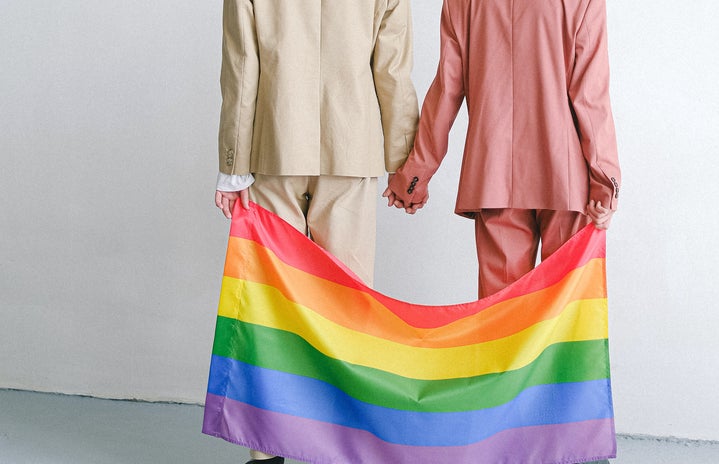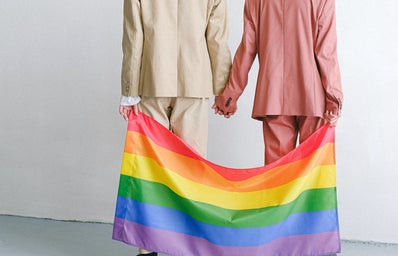Article by Freelancer KC Duru
Earlier this year, Stranger Things actor Noah Schnapp posted a video to the social media app TikTok where he comes out as gay. Text on the screen reads “When I finally told my friends and family I was gay after being scared in the closet for 18 years and all they said was ‘we know’,” as Schnapp mouths along to a then-trending sound saying, “You know what it never was? That serious. It was never that serious. Quite frankly would never be that serious.” Most of the comments were positive and congratulatory, with regular TikTok users, fellow celebrities, internet influencers and even Schnapp’s twin sister Chloe Schnapp expressing happiness and pride in him for coming out. However, some commentators claimed to have “known” that Schnapp was gay prior to his coming out. His sister Chloe said, “u r amazing”, and popular TikToker Chris Olsen said “welcome king”. On the other hand, user @_emmatainment_ claimed that “We all knew!! Most people are like finally lol!”, User @girlsandcorpses added “THE WAY NO ONE IS SHOCKED😭😭😭😭😭”, and user @all.about..autumn comments that “i knew when i saw your sassy walk in st4 😂 i was like he did that a lil too well 😳💓”.
These kinds of comments bring attention to a larger phenomenon I’ve noticed over the past couple of years: audiences presuming a celebrity is queer based on how they carry themselves. It seems to happen more with male celebrities who act or carry themselves in a less-than-stereotypically masculine way, play a canonically queer or queer-coded character in a show or series or even just strongly support LGBTQ rights. For example, singer Shawn Mendes(fc) has been mislabeled as gay by fans for years, even though he’s affirmed more than once that he’s straight. On the “Armchair Expert podcast hosted by Dax Shepard, Mendes dives into the awkwardness of the rumors, saying “You want to say ‘I’m not gay but it’d be fine if I was gay[…].’ You don’t really know how to respond to the situation.” Schnapp and Mendes have one thing in common: neither of them are “masculine” in the traditional sense of the word. They’re not “macho,” and they’re secure enough in their identities as men that they aren’t afraid to show their feminine side. This security is often taken as an invitation by internet users to debate their sexual orientation.
Other celebrities like singers Billie Eilish and Harry Styles have been accused by the general public of “queerbaiting,” because of their outspoken support of the LGBTQ community, the way they choose to dress and Styles’ choice, in particular, to keep his sexuality unlabeled. Dictionary.com defines queerbaiting as “the practice of implying non-heterosexual relationships or attraction (in a TV show, for example) to engage or attract an LGBTQ audience or otherwise generate interest without ever actually depicting such relationships or sexual interactions.” Actor Kit Connor is a celebrity recently accused of this. Connor rose to fame for his role as Nick Nelson, a queer high schooler in a gay relationship on the Netflix series Heartstopper. According to an article by Variety, fans began speculating about Connor’s sexuality after seeing him holding hands with female co-star Maia Reficco from the upcoming film A Cuban Girl’s Guide to Tea and Tomorrow. As a result of these growing rumors and accusations, Connor posted his coming-out on Twitter, writing “Back for a minute. I’m bi[sexual]. Congrats for forcing an 18 year old to out himself. I think some of you missed the point of the show [Heartstopper]. Bye.”
Increasing public access to celebrities’ personal lives has resulted in this culture of near-forced outings. The first issue with accusing celebrities of queerbaiting is that the term is meant to describe TV shows and films. So basically, people can’t queerbait. Referring to people as queerbaiters assumes that the person is straight to begin with, and makes it difficult for people to explore their sexualities and gender expression. Curiosity about celebrities’ sexualities can be partially attributed to LGBTQ audiences wanting more queer representation in Hollywood and the media we consume. As a queer woman myself, I completely understand that desire. However, feeling entitled to knowing, obsessively critiquing and speculating on the sexualities of our favorite celebrities in the name of queer representation does more harm than good.
My main gripe with this speculation is the ramifications for celebrities who are queer and just closeted, like in Connor’s case. There are probably so many closeted celebrities, just like there are closeted people among the general public. And although LGBTQ rights have come a long way, queer people still face a lot of discrimination, even in spaces as seemingly liberal as Hollywood. Constantly characterizing a closeted person as queer because of the way they choose to present themselves, projects they choose to be a part of or causes they choose to support (a characterization that is amplified with celebrity status) isn’t just uncomfortable for that person but helps to reinforce harmful stereotypes that perpetuate toxic masculinity. Associating men’s expression of femininity with queerness affirms traditional views on how men should act and present themselves. The best way to see more queer representation is to allow people to be themselves. Despite there still being work to be done in accepting and acknowledging LGBTQ existences, people are more and more comfortable being out and true to who they are. People will come out when they are ready to, and the result will be genuine queer storylines and characters, and celebrities willing to share their queer identities.


